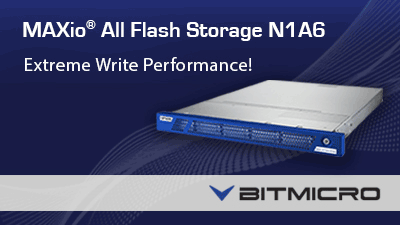| .. |
see also:-
BiTMICRO
- mentions on StorageSearch.com,
BiTMICRO's blog
after AFAs -
what's the next box?
latency loving
reasons for fading out DRAM
The
ups and downs of capacitor hold up in 2.5" flash SSDs
boom bust
cycles in memory markets - any lessons for SSD? |
| .. |
|
BiTMICRO was ranked #22 in the
Q3 2016 edition of
the Top SSD Companies
which is researched and published by
StorageSearch.com
BiTMICRO's
best rank in this series was #1 - in
Q4 2007 - when
there were only 63 companies operating in the SSD market (10x less than
today). |
|
| .......... |
| Who's who in SSD? - BiTMICRO | |
by
Zsolt Kerekes,
editor - StorageSearch.com
- July 22, 2015
10 years ago BiTMICRO was one of the first SSD
companies to launch flash SSDs specifically for enterprise apps acceleration
with a range of 3.5" SSDs with SCSI and later FC compatible interfaces.
And in 2007
and 2008 the
company was the #1 SSD company in the
Top SSD Companies List
for several quarters.
But for several years after that BiTMICRO was
unable to maintain a leading position in the enterprise market and dropped out
of sight and mind of the market - although the company did make a reappearance
in the 2nd half of 2014 after reporting on successes with its partner
RunCore in China in
August
2014.
It's easy to see now that the main reasons for BiTMICRO's
dip in market relevance were:-
- the growing number of SSD suppliers and the change in competitive landscape
from being one of a handful of vendors to being one of hundreds.
- the market adoption towards
PCIe SSDs being the
predominant high end server acceleration tools of choice in the 2007 to 2015
period - instead of SATA, SAS or FC 2.5" or 3.5" SSDs. BiTMICRO was
late entrant in this market - shipping its first enterprise PCIe SSDs in 2012.
- the enterprise
market acceptance
of MLC in various flavors as the mainstream flash memory technology.
BiTMICRO - which designs it own flash controllers - seemed somewhat
out of date and stuck in an SLC rut until December 2012 when it introduced eMLC
flash into into its PCIe SSD product line.
That was a technology
disadvantage in the enterprise market of the 2012 to 2015 period - when even
better funded vendors who were able to offer cheaper, lower
DWPD models in their
ranges based on cheaper flash were struggling to get and retain market share. It's
difficult for all companies (even the market leaders) to sustain their business
positions in the turbulent SSD market of today.
But in mid 2015
BiTMICRO still looks active in the enterprise SSD market - albeit now
playing a quieter and much smaller role in a big game which - as a flash
SSD pioneer - it helped to invent.
|
| . |
|
|
In November 2000 -
BiTMICRO announced the
release of its E-Disk SCW35 which was the world's first true hot swappable SCSI
SSD.
In November
2007
-
BiTMICRO announced
plans to sample a terabyte
class 3.5" flash SSD in Q108. With 1.6TB capacity and a 4Gbps
Fibre Channel interface -
it will deliver sustained throughput more than 230MBps and upwards of 55,000
IOPS. ...Later:- BiTMICRO announced the 1st customer shipments of this much
anticipated product line in November 2008.
In
March 2009
- BiTMICRO's CEO -
Rey Bruce - shared his
SSD Bookmarks
with readers of
StorageSearch.com.
In
May 2010
- BiTMICRO published a
white paper
(pdf) which describes the
risks of SSD
data loss from power disturbances - and outlines the design approach they
have taken to minimize data corruption in their E-Disk Altima SSD product range.
- "Power is a fundamental need but it can also be the biggest threat to the
reliability and operation of any system." ... read the
article (pdf)
In October 2011 -
BiTMICRO collaborated
with Cadence and
Synopsys to set up a
new micro-chip design
training center in
the Philippines - called the Bruce Institute
of Technology - named after the Bruce brothers who founded BiTMICRO.
In
November 2011 -
BiTMICRO
announced
that it has designed a new generation of enterprise
SSD controllers which
will deliver upto 400,000 IOPS performance, support upto 5TB capacity and will
be available in SSDs with SAS,
SATA,
Fibre Channel, and
PCIe interfaces in the
first half of 2012.
In January
2012 - BiTMICRO
announced
that its new TALINO-DE
- SSD controller -
has just gone through
tape-out
with Global Unichip.
"The
combination of GUC's PCIe, SATA, SAS PHY IP products and the broad scope of
their flexible SoC design services, manufacturing capabilities and strong
relationship with TSMC gave us no reason to hold back in our designs. From the
start, we are confident the TALINO-DE controller will create a huge impact in
the storage industry. Backed by GUC's world-class testing facilities, we know
they are the most viable option for us," said Rey Bruce, CEO of BiTMICRO
Networks.
In June 2012 -
BiTMICRO has
obtained
over 600 IP assets from QualCore
whose portfolio includes analog, digital, and mixed-signal IC design.
Engineers retained from QualCore's IP and ASIC services team have joined the
recently established BiTMICRO India.
In January 2013 -
BiTMICRO launched a
marketing program to license its Talino SSD controller.
In August 2015
BiTMICRO released the
MAXio Z-Series enterprise PCIe
SSDs (gen 3 8 lanes) which are controlled by its patented Talino ASIC
architecture. |
|
BiTMICRO - earlier editor comments
Earlier
comments:- January 2013 - recently BiTMICRO officially confirmed that
it had changed its business strategy from being (mainly) a supplier of rugged
embedded SSDs for the
industrial and
military markets - to
becoming a supplier of fast SSD controllers and fast SSDs aimed primarily at
the enterprise SSD market.
Behind
this change has been the long drawn out development of the company's fast
enterprise focused Talino controller family - which is also the core enabling
technology in its recently sampling PCIe SSDs.
Late to market and
lacking the business resources to productize the controller family in all
the competitive market slots into which it might be used in SSDs - BiTMICRO's
strategy is to offer it to other SSD makers and systems companies.
The
enterprise market isn't entirely new territory for the company.
BiTMICRO
put out tentative steps into the server market with its
parallel SCSI
SSDs in 2004 and later (in 2007) with a range of
3.5" FC SSDs too.
But those early customer experiments didn't leave much in the way of enduring
routes to market.
So - in the much more competitive and complex SSD
market of today - it's fair to say that the company is making a fresh start.
Who's who in SSD?
- by
Zsolt Kerekes,
editor - February 20, 2012
BiTMICRO is 1 of more than 100
companies listed in these directories:-
military SSDs,
industrial SSDs,
3.5" SSDs,
2.5" SSDs,
FC SSDs,
SATA SSDs,
PATA SSDs,
PCIe SSDs,
SCSI SSDs and also in
the
Top 20 SSD companies.
There
have been many times in
SSD history
that a company which everyone is talking about as the technology and market
leader - fails to maintain its momentum - and disappears from view...
Sometimes
for years.
Often forever.
In the past 30 years I can only
think of 3 companies which have achieved significant comebacks after a
protracted multi-year market sabbatical and yet managed to generate the
same level of excitement (or more) as they did the first time around.
A
4th one of those in 2012 could well be BiTMICRO.
talking "enterprise
flash SSD" in 2000
Like all the flash SSD pioneers in the mid
to late 1990s BiTMICRO started out in the rugged embedded industrial /
military market.
(There was no such thing as a "consumer"
market for SSDs in those days - because high capacity fast MIL SSDs cost
upwards of $10K each.)
But amongst all the ruggedness and reliability
talk - which were part of the flash SSD vernacular - BiTMICRO sometimes
threw in a word which was seldom mentioned in the context of flash SSD storage
- "enterprise".
There already were enterprise SSD companies
around at the start of the new millenium - but "enterprise SSDs"
were understood to be "RAM SSD". You didn't
even have to add the word "enterprise". All SSDs were either - RAM
for server acceleration - or flash for rugged apps. The distinctions within
flash came much later.
BiTMICRO was the first flash SSD maker to
seriously raise the topic of using flash SSDs to replace HDDs in enterprise
storage. And this was no - pigs might fly talk - because BiTMICRO had the
technology to do it - even if the costs were still prohibitive.
For
example in 2000 when they launched the 1st true hot-swappable SCSI SSD they
talked about using it in RAID systems.
And in 2004 the company
published a case study showing how a single one of its 3.5" flash SSDs was
able to accelerate a 25,000 user email system - giving performance 4x faster
than RAMdisk and 15x faster than HDD RAID.
And at the tail end of
2007 the
company unveiled a high speed
terabyte class 3.5" FC
flash SSD.
That was exciting stuff - and for a brief time it
looked like BiTMICRO might step out of its industrial / military safety
blanket to emerge as one of the future leaders in the enterprise flash SSD
market too.
But that didn't happen.
And if there was even
a tentative step in that direction - it took too long - and nobody noticed in
the glare coming from a rush of new start up traffic racing along the newly
enlarged SSD market highway.
just another SSD company
By
the end of
2008 there
were over 100 companies in the SSD market - and many SSD pioneers were sidelined
by the competitive onslaught.
Customers didn't have to wait for
pioneers like BiTMICRO to scale their technologies and design new products. In
the next few years - new companies were entering the SSD market at a rate
greater than one a week.
Our readers didn't hear so much from
BiTMICRO and it appeared to go back into stealth mode.
If you'd
asked me a year ago what I thought about BiTMICRO - I would have said - this is
a company which was once a mover and shaker in the early days of the flash SSD
market - but its most notable achievements have been in the past.
BiTMICRO's
website had become so dormant it gave the distinct impression of being
another "gone-away" storage company.
re-emerging from
stealth mode
When BiTMICRO contacted me again in the summer of
2011 after a long period of silence I said I was surprised to hear they were
still in business.
BiTMICRO's Marketing Manager,
Cecilia Martorillas
told me that the company had been working in its heartland of high
performance rugged SSDs and that unlike many others in their market who had
chosen the SandForce inside route as the way to market continuity - all the
SSDs BiTMICRO offered still used their own design of controllers.
At
that time all BiTMICRO's SSDs used SLC flash but Cecilia said they would
soon be announcing details of new MLC SSDs and controllers.
BiTMICRO
unveiled details of its new SSD controller architecture in November 2011 -
and in January 2012 announced that it had taped out the new chips.
So
we can expect to see new SSDs based on this new controller - called the
TALINO-DE - sometime in the next few quarters.
has the long wait
for a new BiTMICRO enterprise SSD been worthwhile?
The multi-core
TALINO-DE is
big SSD
architecture (manages hundreds of flash chips) and includes full data path
protection, end-to-end
data integrity,
embedded AES engines for data
security, embedded XOR engines for delivering faster transaction processing
in RAID configurations,
power
management, and other resource optimization.
It is expected to
deliver upto 400,000
IOPS performance,
support upto 5TB capacity and will be available in SSDs with
SAS,
SATA,
Fibre Channel, and
PCIe interfaces .
When it ships - this enterprise SSD controller will be the most
significant product family from BiTMICRO in more than decade.
In
performance terms it fits
Depending
how the product will be marketed - and it's not publicly known at the present
time - whether SSDs using the new controller will only be available from
BiTMICRO - the new SSDs could create a market buzz like we haven't seen since
SandForce emerged from stealth mode in
2009.
For
more info about BiTMICRO take a look at the links above and
BiTMICRO
- editor mentions on StorageSearch.com.
I currently talk to more
than 300 makers of SSDs and another 100 or so companies which are
closely enmeshed around the SSD ecosphere - which are all profiled here on
the mouse site.
I learn about new SSD companies every day, including
many in stealth mode. If you're interested in the growing
big picture of
the SSD market canvass - StorageSearch will help you along the way. Many
SSD company CEOs read our site too - and say they value our thought leading SSD
content - even when we say something that's not always comfortable to hear. I
hope you'll find it it useful too. |
| . |
| BiTMICRO's
new Big SSD Architecture - ASIC platform |
Editor:- November 21, 2011 - BiTMICRO today
announced
that it has designed a new generation of enterprise
SSD controllers which
will deliver upto 400,000
IOPS performance,
support upto 5TB capacity and will be available in SSDs with
SAS,
SATA,
Fibre Channel, and
PCIe interfaces in the
first half of 2012.
BiTMICRO's new ASIC based platform architecture consists of a
multi-core SSD controller integrated with multiple high-speed serial on-chip
buses and embedded processors
"It is with high anticipation that
we see these technologies come to fruition and work for our customers" said
BiTMICRO's CEO, Rey
Bruce.
Editor's comments:- 4 years ago BiTMICRO was at
the top of its game (and
#1 in the top SSD
companies list) with an industry leading terabyte class
3.5" FC SSD
sampling (called the E-Disk
Altima ) but the company's market was in the gunsights of about 50 newly
emerging flash SSD companies in that
Year of SSD
Revolutions which soon after grabbed many of the sub-markets which
previously had been divided up among just a handful of enterprise flash
vendors.
Back to today's news from BiTMICRO...
A 2 stage SSD
controller architecture - with a core intelligent unit - which fans out to
distributed flash slave teams is a proven architectural concept in high
performance enterprise SSDs.
For example it's used in products by
Virident Systems
(whose controller can keep 256 flash die active concurrently on R/W garbage
collection etc) and a 2 stage design is also used by
Texas Memory Systems
(whose host side facing controller can
packet up multiple
FC channels into a single virtual route into the flash array). |
 |
These are examples of what I call
big SSD
architecture - which is more efficient (higher percentage of usable
capacity), faster and more
reliable in large
capacity SSD products than the alternative - which is building arrays of "small
architecture" SSDs. | | | |
| . |
| . |
|

| |
.. |
| How Flash
Arrays Help US DoD and DHS protect against threats |
Editor:- July 2, 2016 - A new blog by Zophar Sante,
VP of Business Development at BiTMICRO -
How AFAs
Help US DoD and DHS outlines how the roles of solid state storage have
changed in US government defense and security agencies in the past 20 years.
Among other things: - Zoph says - "The DoD and DHS are using
what they learned from SSDs in field and applying the same technology to their
data centers." ...read the
article
Editor's
comments:- From the
SSD history
perspective BiTMICRO was a pioneer of high performance flash SSDs for the
military market and one of the earliest advocates of flash in enterprise arrays.
Before
the onset of the flash SSD era, however, DoD was already using rackmount
SSDs in the late 1980s for mobile data capture and analysis. In those days
the SSD memory technology in such boxes was inevitably
DRAM.
You can
read recollections about that in the 2010 retrospective paper -
TMS History of
Working With the US DoD (pdf) by the founder of
Texas Memory Systems.
| | |
.. |
| Permabit
shrinks data in BiTMICRO's new AFA boxes |
| Editor:- October 20, 2015 - Permabit today
announced
that its inline dedupe and compression software is used in BiTMICRO's new
rackmount SSD white boxes - which include a 1U iSCSI appliance (20x 2.5"
TB SSD shown at FMS) and a 3U
fast SSD server (8x PCIe SSDs) which is due to be shipped this quarter. | | |
... |
| BiTMICRO has new faster,
denser PCIe SSD |
 Editor:-
August 11, 2015 - BiTMICRO
announced the release of the company's MAXio Z-Series enterprise
PCIe SSDs (gen 3 8
lanes) which are controlled by its patented Talino ASIC architecture. The new
Z-Series provides up to 8.8TB in a PCIe edge card form factor and also includes
military-class erase technology. For 4KB blocks the R/W IOPS and latencies are
respectively - 430K 50S and 150K 30S respectively. Editor:-
August 11, 2015 - BiTMICRO
announced the release of the company's MAXio Z-Series enterprise
PCIe SSDs (gen 3 8
lanes) which are controlled by its patented Talino ASIC architecture. The new
Z-Series provides up to 8.8TB in a PCIe edge card form factor and also includes
military-class erase technology. For 4KB blocks the R/W IOPS and latencies are
respectively - 430K 50S and 150K 30S respectively.
Editor's
comments:- BiTMICRO which 10 years ago was a pioneer in the high performance
enterprise flash SSD market got kind of swept aside from mainstream market
view for many years as the market expanded and the rate of memory innovation
seen in such SSDs changed too fast for most companies to keep up.
For
years the company retrenched back into its safe roots in industrial military
applications - and like many other SSD companies - it has had business setbacks.
But it's also had some customer successes too with its newer SSD technologies
in the China market in partnership with
RunCore. | | |
... |
 |
... |
| BiTMICRO has new VP of
Engineering |
Editor:- April 16, 2014 - It's been 9 months
since I last saw a news announcement from BiTMICRO.
But
I heard today that the company recently
announced
that Bharadwaj
Pudipeddi has joined the company as VP of Engineering and Lead
Architect. Among other things - Pudipeddi's past design roles in
notable SSD companies
include 2 years at Violin
Memory. | | |
... |
|
|
... |
| BiTMICRO invites you to
design SSDs and systems using its fast Talino SSD controller |
Editor:- January 8, 2013 - BiTMICRO today
publicly confirmed that it's offering its Talino SSD controller to other
manufacturers in what the company calls the
"BiTMICRO
OnBoard" Program.
"It's undeniable that the solid state
storage industry is growing rapidly," said Zophar Sante,
VP of Marketing and Sales at BiTMICRO. "We're not only speaking with
companies that want to use our SSD controller technology to develop their own
solid state drive solutions, but also with companies seeking to embed solid
state storage natively into their own vertical application platforms."
Editor's comments:- in my 2010 article -
Imprinting the brain
of the SSD - I discussed the most successful design win program in the
history of the SSD controller market (so far) by SandForce (now part of
LSI) whose
award winning
controllers are now used by more than 60 SSD companies.
One of
the big differences between that original program and what BiTMICRO is doing now
- is that BiTMICRO's primary business is selling complete SSDs whereas SandForce
didn't sell SSDs and neatly avoided some of the conflicts of interest which LSI
is seeing now with frenemmies who use the same controller but compete for some
of the same design slots at the complete SSD level.
That suggests to
me that potential Talino technology partners are more often going to be
systems companies rather than companies which simply sell vanilla SSDs.
Getting
access to the Talino SSD controller will provide systems makers with similar raw
performance to what they can get from integrating current industry standard
PCIe SSDs but at lower
cost and in a customizable physical footprint.
Although BiTMICRO's
customers will have to invest in a lot more design than if they used ready made
SSDs - the scalability and flexibility of a chip family approach means that
some system designs which wouldn't be viable with today's building blocks will
become competitive.
Just as
all PCIe SSDs aren't
all exactly the same - I'm sure we'll be surprised in a year or so to see
just how different some of the systems based on the Talino will be. My guess is
they will span the full range of fast apps from lowly customized
2.5" PCIe SSDs
upto supercomputer scale racks.
BiTMICRO hasn't published details of
what its partner vetting and getting onboard process will be. They're simply
asking potential partners to contact them (if you haven't done so already). | | |
| . |
high availability
enterprise SSDs
how fast can your SSD
run backwards?
don't
all PCIe SSDs look pretty much the same?
Enterprise SSDs
- the Survive and Thrive Guide
adaptive R/W
flash care IP (including DSP) for SSDs
The enterprise
flash story... could it have been simplified?
Decloaking
hidden preference segments in enterprise flash
90%
of enterprise SSD companies have no good reasons to survive
|
| . |
| who are the ideal customers
for BiTMICRO 's new (but late to market) Talino based maxIO PCIe SSDs? |
Editor:- December 12, 2012 - BiTMICRO today
said
it's begun manufacturing its pre-announced
maxIO
(PCIe SSDs) which use
the company's Talino (means "talented",
big architecture,
SSD controllers).
The first product in this range will be a full height, half-length
400K random
IOPS (4KB), 4.5TB (eMLC) PCIe SSD.
Editor's
comments:- A few weeks ago I asked BiTMICRO's new VP of Marketing Zophar Sante
(who among other things founded
SANRAD) what the
company's plans were for leveraging the Talino controller - because it had
seemed to me that BiTMICRO didn't have the resources to exploit this technology
in all the markets where it might be applicable.
Zoph said BiTMICRO
plans to offer the chip set to other companies in what would be in effect -
a "BiTMICRO onBOARD" kind of program.
The company's
target market for the maxIO product line includes what I call
dark matter enterprise
end users in addition to the usual enterprise channels such as oems.
Architecturally
the closest product to the maxIO is the
RamSan from
Texas Memory Systems -
which is now part of IBM. Closest insofar as it's got one or more ultra fast
central controllers which expand via data movers / intelligent I/O peripherals
which fan out to more flash.
One of the problems I see for BiTMICRO
though is that - because it's so many years late coming into the enterprise
PCIe SSD market - it will have to focus its efforts on a very restricted set
of technical customers who want to better the performance they can get from
arrays of small architecture PCIe SSDs (like those in established PCIe SSD
products from OCZ and
LSI) and who prefer to
use their own software
and who don't want to get tied into
Fusion-io's seductive
APIs - and who also like the idea of raw brute peak performance rather than
the predictable rounded performance of
Virident and
customers who maybe would have been satisfied with a RamSan type of product -
but who either see themselves as competitors to IBM or want to retain the
option of buying their critical supplier (BiTMICRO) or having large share of
mind of that supplier if the maxIO product becomes strategic in the customer's
own business. | | |
| ... |
| more about BiTMICRO's
Talino |
Editor:- November 27, 2012 - A year after
BiTMICRO
first unveiled
its quad core Talino SSD controller architecture (which is intended for use
in fast enterprise SSDs) the company is now revealing more details about
the other part of its 2 tier architecture - the ISIP (Intelligent Storage
Interconnect Platform).
"One of the innovative attributes of the
Talino architecture is its 'building block' design. A single Talino ASIC can
connect to as many as 60 ISIP chips, each connecting to up to 8 flash die,"
said Zophar
Sante, VP of Marketing and Sales, BiTMICRO - "Multiple Talino
ASICs can easily interconnect via a PCIe switch to create 1U, 2U and 3U complete
storage systems with enormous capacities and blistering performance. These
Talino based storage systems can use "off the shelf" front-end file
systems that support FC, FCoE, iSCSI, NFS, CIFS, Ethernet and can also include
volume management, virtualization and storage services software."
BiTMICRO
says the Talino ASIC is very versatile. Interface controllers are built
directly into the chip, with 8x 5Gb PCIe lanes, 2x 6Gb SAS ports and 2x 6Gb SATA
ports.
"The technology we put into our Talino Architecture puts
BiTMICRO far beyond what anyone else is doing with solid state storage,"
said Rey
Bruce, CEO, BiTMICRO. "In terms of performance, scalability, and
reliability, there's no other architecture that can match what Talino can
deliver. And we will continue the innovation of Talino so it will remain
cutting edge for years to come." | | |
| .. |
| BiTMICRO acquires mixed
signal IP assets from QualCore |
Editor:- June 5, 2012 - BiTMICRO today
announced
it has obtained over 600 IP assets from
QualCore whose portfolio includes
analog, digital, and mixed-signal IC design.
Engineers retained from
QualCore's IP and ASIC services team have joined the recently established
BiTMICRO India.
The acquisition also brings BiTMICRO closer to its
goal of bringing the entire development cycle in-house, from ASIC design to
characterization testing. | | |
| . |
| Fast Purge SSDs |
The need for fast and
secure data erase - in which vital parts of a flash SSD or its data are
destroyed in seconds - has always been a requirement in military projects.
 Although
many industrial SSD vendors offer products with extended "rugged"
operating environment capabilities - and even
notebooks SSDs come
with encryption - it's the availability of fast data purge which
differentiates "truly secure" SSDs which can be deployed in
sensitive applications. Although
many industrial SSD vendors offer products with extended "rugged"
operating environment capabilities - and even
notebooks SSDs come
with encryption - it's the availability of fast data purge which
differentiates "truly secure" SSDs which can be deployed in
sensitive applications.
| | |
| . |
| |








